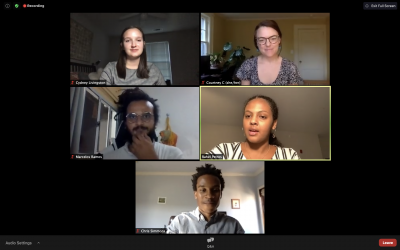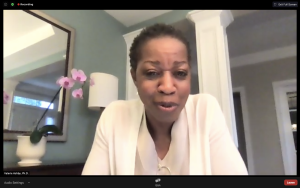Black Lives Matter Brazil-USA

A virtual exhibit and event bring student scholarship to new audiences
When Mellon Visiting Professor Silvio Luiz de Almeida arrived at Duke this spring, he partnered with History Professor John French to offer students a timely, global look at the parallel struggles for racial justice in Brazil and the United States – two countries in the Western Hemisphere with the largest Afro-descended populations.
Almeida and French planned an innovative final project for their course: student contributions to an exhibit about a global movement in defense of Black lives. As the semester concluded, students enrolled in the course who decided they weren’t finished with the material joined a research and project team to keep working on the exhibit over the summer. Other undergraduates in search of opportunities to grow and learn in a year when racial justice was at the forefront of public consciousness also joined the effort.
The culmination of that work was on display October 7, when the History Department hosted a launch event for their website. The virtual exhibit highlights an international dimension of struggles for rights and recognition by Black people in two of the world's largest democracies. It also encourages participation in meaningful, anti-racist action and crucial conversations.
Pairing Scholarship and Action

“We owe it to ourselves and the broader community to not only live these four years in the Duke bubble, but to go beyond the comforts of the classroom and campus life and even our country to make real change in the communities and spaces we occupy,” said sophomore Rahel Petros, who spoke during the launch event.
The more than 20 undergraduate team members were supported and mentored by graduate students Courtney Crumpler, MFA student in Dance; Gray Kidd, Ph.D. student in History; Duke and International Comparative Studies alumna Chloe Ricks; and Brazilian Ph.D. candidate and activist Marcelo Ramos of Universidade Federal Fluminense.
“We talk about Duke as a global university,” said Provost Sally Kornbluth. “This is a powerful example of how we can learn about the circumstances of our own country through a comparative global lens.”
She also noted how their work exemplifies the way “an academic, analytic approach can be coupled with a call to action and a call to activism.”
Each student who spoke at the event shared something they took away from the experience, or how they discovered a research area that spoke to their particular interests.
“One of the things that I feel most proud about…is how (the exhibit) tells history non-linearly, and embraces the messiness rather than subscribing to simplistic, mainstream narratives,” said Cydney Livingston, a junior and project team member majoring in Biology and History.
Another Duke Dance MFA student, Juliet Irving, designed the website.
“With my sports background…I analyzed how sports activism has evolved,” said Chris Simmons, a junior studying Public Policy who is also a manager for the Duke Men’s Basketball team.
“We have seen now, more than ever…that athletes are using their platforms to create social change. They aren’t ‘shutting up and dribbling’ but instead they are using their influence to drive the Black Lives Matter movement forward.”
A Reflection of Duke Priorities
In addition to the student presenters and Provost Kornbluth, Duke President Vincent Price and Dean of Arts & Sciences Valerie Ashby also spoke to the more than 100 people in attendance. Price tied the project to the university’s emerging anti-racism effort, which was outlined in his June 17 message to the Duke community.
“At Duke, we’re committed to the pursuit of knowledge that can provide real leadership in our community and the world – a mission that the History Department’s work in racial justice exemplifies,” Price said.
He encouraged everyone to focus on “four Hs” as we embark on difficult conversations that challenge us to think about “our own perspective and our institutional history.” They are humanity, humility, honesty and hope.

“In our collective capacity to change, a place like Duke can be a real partner to others,” Price said. “And that is of course the goal – positive change.”
Dean Ashby quoted extensively from a book she is currently reading – Caste by Isabel Wilkerson – and shared what she believes it will take to make meaningful change at Duke and in the world.
“I am a firm believer that we cannot fix a problem that we cannot see, or are not willing to see,” Ashby said.
“What we do here (at Duke) is we shed light. You all just shed more light by your presentations and also by this project. I am confident that where we have light, we have the potential to see…and that gives us the chance to actually take real action that matters.”
Student-led Scholarship

The October 7 event culminated in a conversation between professors Almeida and French, who together covered topics ranging from race at Duke and in America, to life as a Black academic in Brazil, and what they each learned from teaching the Black Lives Matter Brazil-USA course.
“(The students) made the course and this exhibition possible,” Almeida said. “It was their intelligent inquiries, life experience, generosity and willingness to learn and teach that shaped the soul of this course. I think that a new generation is rising in this event and this event is the proof of it.”
Dean of Social Sciences Rachel Kranton echoed that perspective in her concluding remarks.
“You have shown us the way,” she said, addressing students. “You have taught us more than we could ever teach you…through your journey to Brazil and back…and through the new media that can amplify your voices.”
The project will expand its footprint even further this spring with an exhibition of window clings displayed outside Penn Pavilion.
“This is not just an exhibition or website,” said Brazilian graduate student Marcelo Ramos. “This is a movement of international anti-racist solidarity.”
The project and event were financially supported by the History Department, Duke’s Brazil Initiative, the Trinity College of Arts & Sciences, and the Dean of the Social Sciences.



